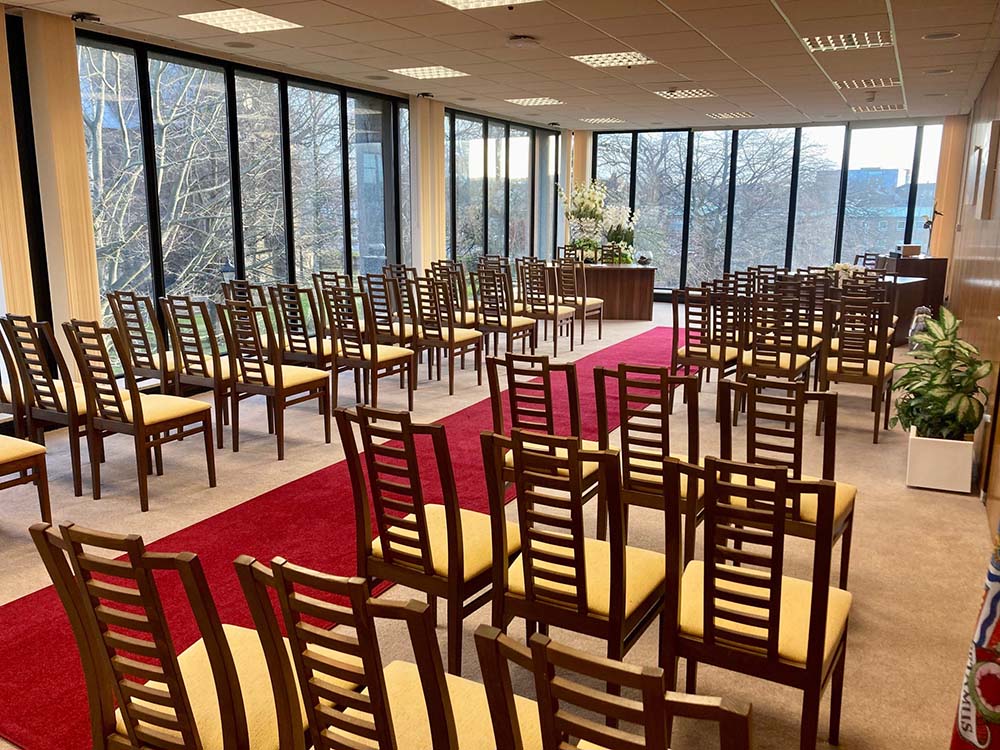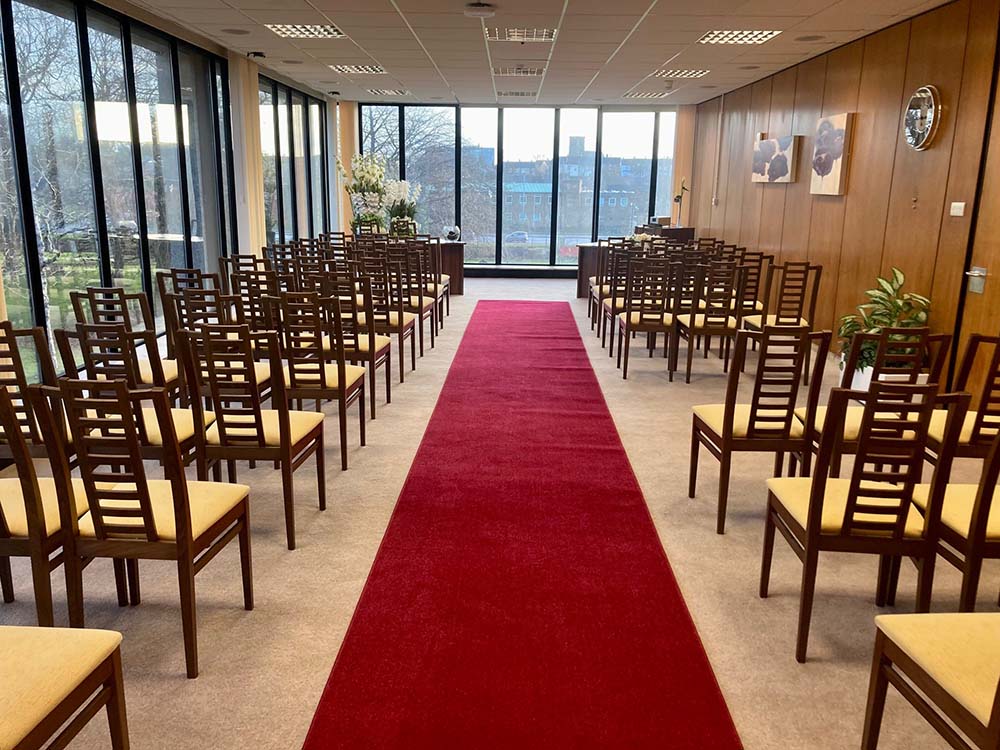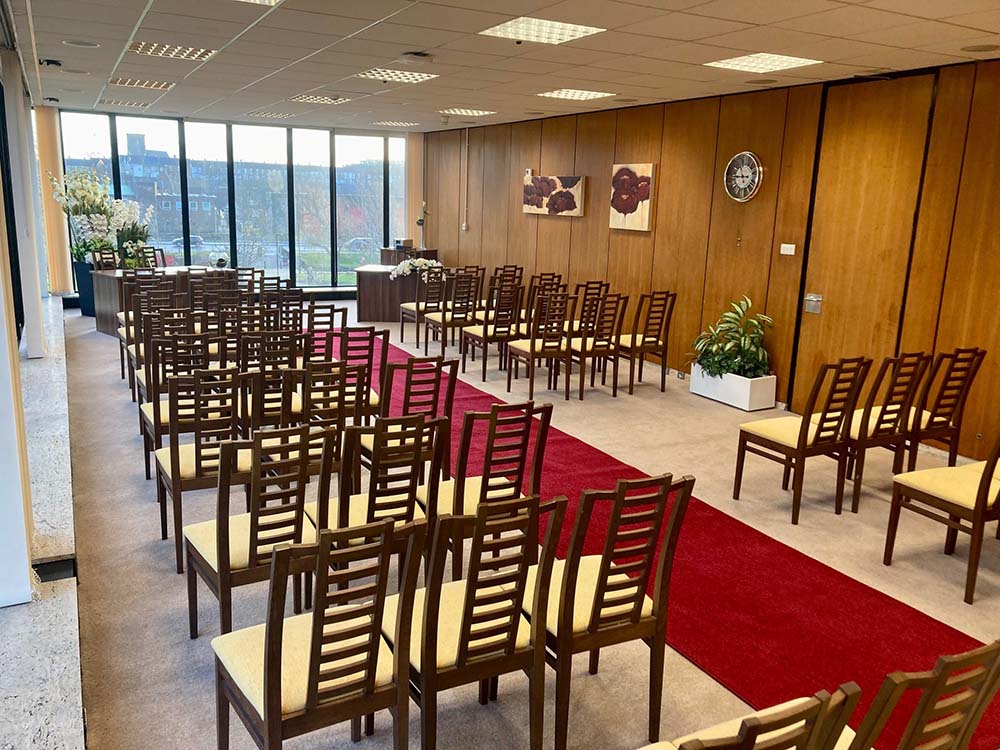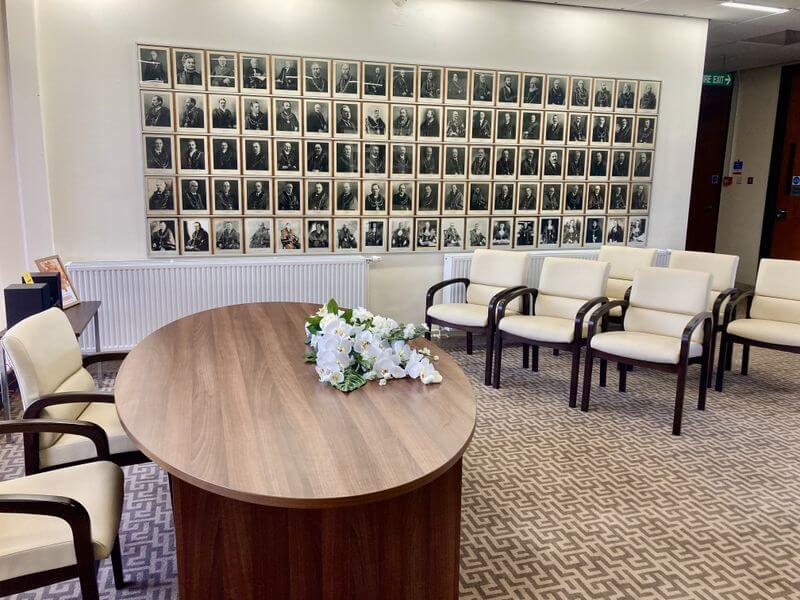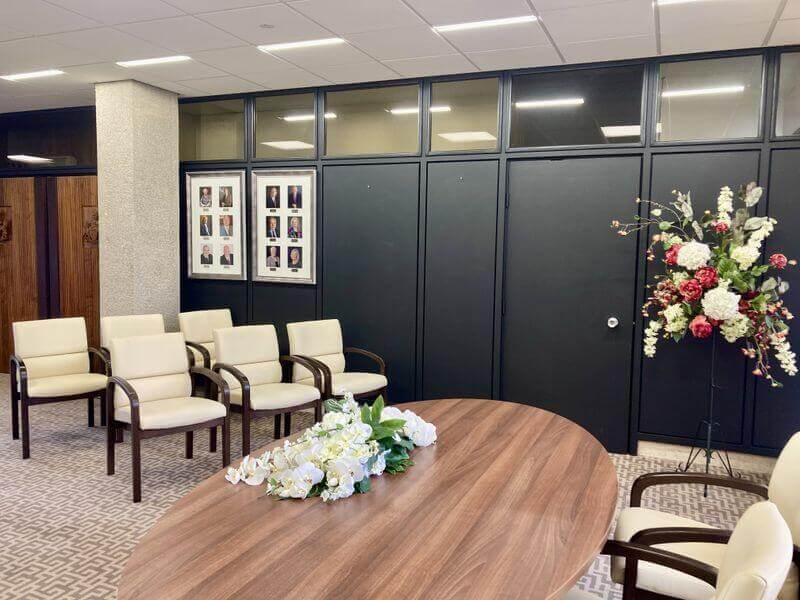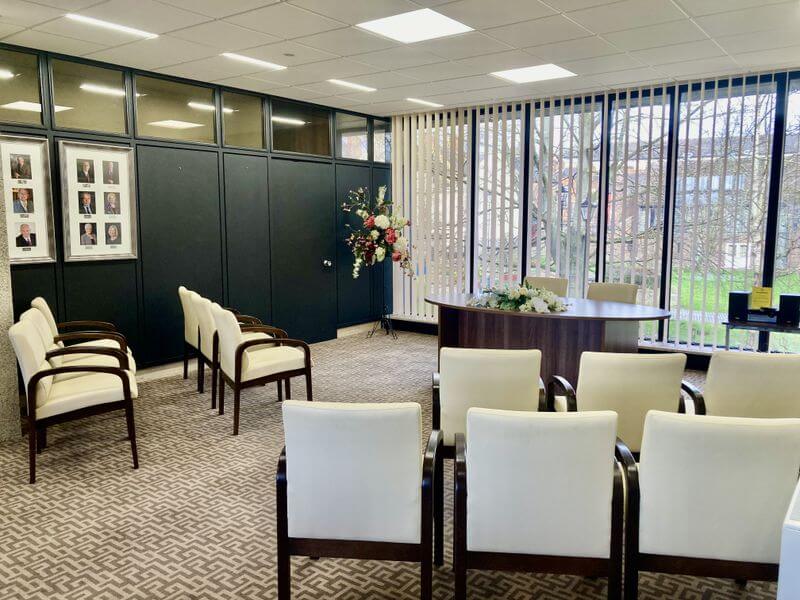Marriages and Civil Partnerships
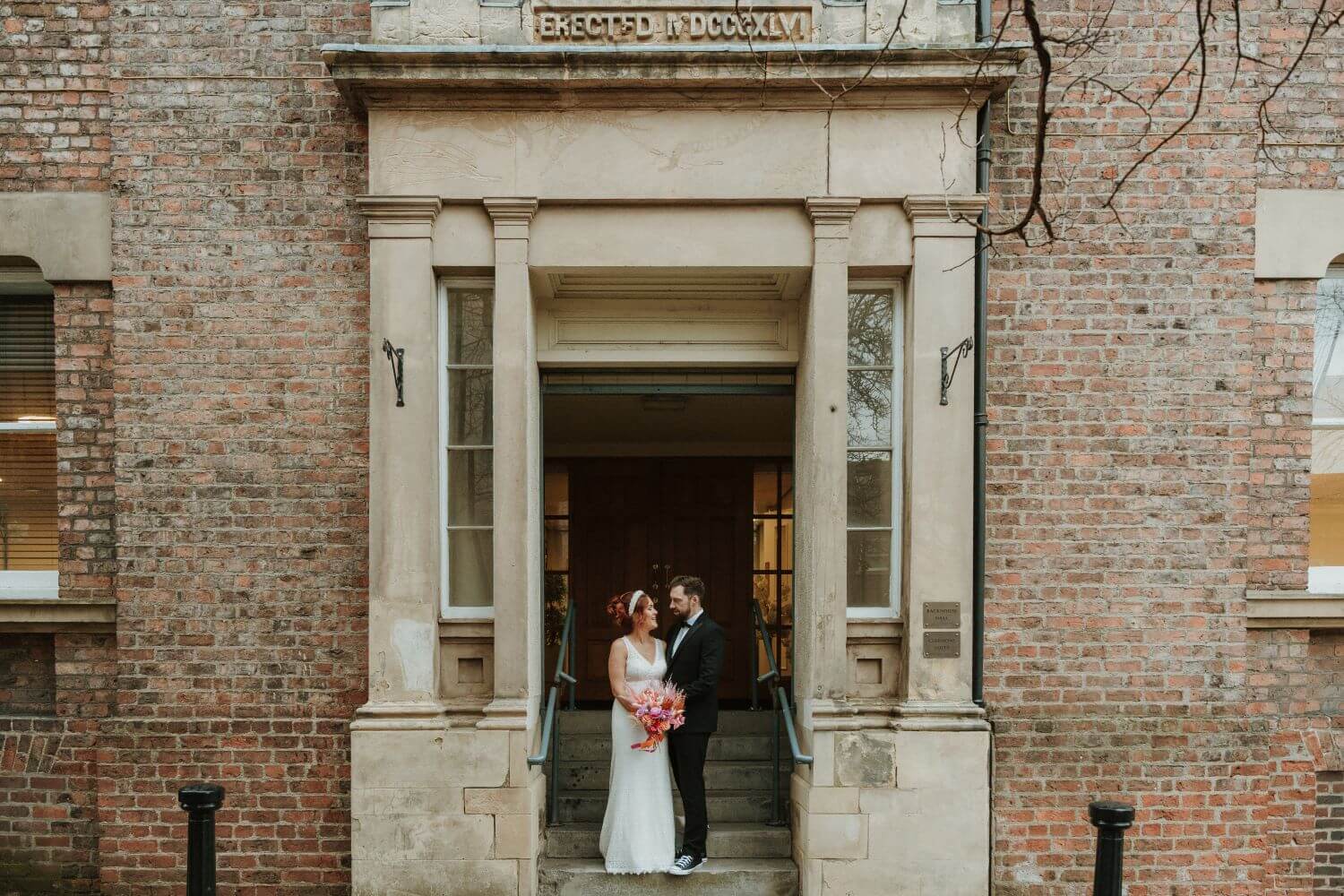
Congratulations on choosing to be married or form a civil partnership
There are lots of decisions and choices to be made as part of organising your special day and the following information should help you.
There are six processes to arranging a marriage or civil partnership.
- Decide where you want to be married/form a civil partnership.
- Book and pay for the venue where the marriage/civil partnership will be.
- Obtain the legal permission to be married/form a civil partnership
- Organise the marriage or civil partnership ceremony.
- Receive your certificates after the marriage/civil partnership
- Tell people who need to know that you have been married/formed a civil partnership.
If you need further advice or information please do not hesitate to contact the register office on 01325 406400 or at [email protected]
A Guide to Getting Married in Darlington [pdf document]
Getting married at the Register Office
The register office remains the most popular place for couples to be married and Darlington register office has three types of ceremonies for you to choose from:
- The Statutory Marriage Room
- The Council Chamber Foyer
- The Oak Room
The Statutory Marriage Room
By law, each Registration District has to designate a 'register office' and provide a Civil Marriage or Civil Partnership Ceremony at a statutory rate.
| Availability | Wednesdays only - at either 9:30, 10:30, 11:30 or 12:30. |
|---|---|
| Price | Please see our fees page for current charges. |
| Number of people who can attend. | The couple being married and two witnesses only. |
| Booking Restrictions |
Can be booked a maximum of a year ahead. |
The Council Chamber Foyer
| Availability |
Monday to Saturdays only at either 11:00; 12:00; 13:00; 14:00; 15:00 and 16:00 (16:00 available Saturdays but not Fridays) |
|---|---|
| Price | Please see our fees page for current charges. |
| Number of people who can attend. | The couple being married, 12 guests (two of whom are the witnesses) and one photographer. |
| Booking Restrictions | Can be booked up to 2 years ahead. |
The Oak Room
| Availability |
Sundays and Mondays - not available. Tuesdays, Wednesdays and Thursdays - 3pm only Fridays - 11am, 12pm, 1pm, 2pm and 3pm Saturdays - 11am, 12pm, 1pm, 2pm, 3pm and 4pm |
|---|---|
| Price | Please see our fees page for current charges. |
| Number of people who can attend. | The couple being married, 50 guests (two of whom are the witnesses) and one photographer. |
| Booking Restrictions | Can be booked up to 2 years ahead. |
Information to help you plan and understand the marriage ceremony
- Getting married at the register office [pdf document]
- Ceremony questionnaire [pdf document]
- Readings [pdf document]
Getting married at an approved wedding venue
Darlington has eight venues other than the register office where you can be married or form a civil partnership. These can be found on our venues page.
| Availability | All days (except Christmas Day and Good Friday) at either 11.30; 13:00; 14.30 or 16.00 |
|---|---|
| Price | Please see our fees page for current charges. |
| Number of people who can attend. | Normally: each approved venue has a number of rooms licensed for civil ceremonies and each designated room has a maximum capacity of persons who can be present. The venue will be able to give you more information. |
| Booking Restrictions |
Available to Darlington and non- Darlington residents. Can be booked up to 2 years ahead. You should check availability with the venue before contacting us. |
Information to help you plan and understand the marriage ceremony
- Getting married at the an approved venue or hotel [pdf document]
- Ceremony questionnaire [pdf document]
- Readings [pdf document]
Booking and organising a marriage or civil partnership at the register office or at an approved venue
If you are getting married in an approved venue, agree a provisional date and time the of the wedding with the venue before continuing. If you want to be married at either Darlington register office or at one of our approved venues then you should:
- Use the online enquiry form to contact us to find out if we are available on the date and time you want. Please do not contact us by telephone or email for availability as we are a busy office.
- You must know approximately where and when you want to be married before contacting us.
- We will contact you and confirm if the date and time is available or offer you an alternative.
You will then have a provisional booking which will be on hold for a month. This will give you time to be sure that you want the venue, date and time.
- Within that month you need to complete the booking form and return it to us either by post or by email.
- You must also pay for the ceremony in full at the time off booking, you cannot pay in instalments. You can pay here on our payments webpage by quoting the reference given to you by the register office.
- We will confirm the booking by email and advise you about giving notice of marriage.
Getting married in a Church of England
- You should contact the church where you want to be married and agree the date and time of the wedding.
- If you are both British citizens you will “give banns” at the church which will give the legal permission to be married and you do not have to contact the register office.
If one or both of the couple being married are not British citizens then the church will refer you to the register office to obtain the legal permission to be married by “notice of marriage” rather than “by banns”.
- The church will issue a marriage document which the couple being married and the two witnesses will sign at the marriage ceremony.
- The church will then arrange for the marriage document to be returned to the register office and we will record the marriage on the national marriage register.
- You will be able to purchase marriage certificates by applying by post to us or from our website copy certificates page. You cannot obtain marriage certificates in person at the register office or apply on the telephone.
- You can now inform people you have been married by showing them your marriage certificate which is also evidence of a change of name.
Getting married in a church or religious building other than a Church of England
- You should contact the church or religious building where you want to be married and agree the date and time of the wedding.
- The church will tell you to contact the register office to arrange to “give notice of marriage” which gives you the legal permission to be married.
- You will be asked to collect a “marriage schedule” and take it to the person who is marrying you. This is a record of the marriage that the couple being married and the witnesses will sign on the day of the marriage.
- The church or place of marriage will arrange for the marriage schedule to be returned to us and we will record the marriage on the national marriage register.
- You will be able to purchase marriage certificates by applying by post to us or from our website copy certificates page. You cannot obtain marriage certificates in person at the register office or on the telephone.
- You can now inform people you have been married by showing them your marriage certificate which is also evidence of a change of name.
Giving notice of marriage
What is notice of marriage?
Notice of marriage gives you the legal permission to be married. The following couples need to give notice of marriage:
- If you are having a marriage in a register office or approved wedding venue eg. hotel.
- If you are having a marriage in a religious building which is not a church of England eg. catholic, Methodist, modern Christian, Sikh, Quaker, Hindu marriages.
- If you are being married in a church of England but one or both of you is not a British citizen.
You do not need to give notice of marriage for:
- A marriage in a synagogue according to the Jewish faith.
- A marriage in a church of England where both of you are British Citizens.
If one or both parties to the marriage will be under 18 years old on the day of the marriage you should also contact the register office for advice.
When do I give notice of marriage?
You can give notice of marriage from 1 year but no later than 29 days before the marriage.
Which register office do I attend?
If you are both British Citizens, then you attend the register office where you both live ie. the council who collects council tax for the property where you live.
This may be the same register office if you live together or you will attend different register offices if one of you does not live in Darlington.
You should only come to Darlington register office to give notice of marriage if you live in a property that is liable for council tax to Darlington Borough Council.
Many nearby villages have a Darlington address and postcode but are not Darlington properties for the purpose of notice of marriage. Newton Aycliffe is not Darlington.
If you are not sure about this please contact us.
We will be unable to take your notice of marriage is you do not live in Darlington.
The process of obtaining legal permission to be married for non British Citizens is also done by giving notice of marriage but the process is different.
If one or both of you is not a British Citizen then you will need to contact us for further advice.
What documents do I need?
There is a fee per person giving notice of marriage which can be paid by cash or card. Please see our fees page for current charges.
The documents you need to bring with you at the appointment can be found on the gov.uk documents you'll need webpage [external link].
If you do not have a current valid passport as stated you must bring your own and your mother’s birth certificate.
If you do not bring the correct documents with you then you will need to re-book your appointment.
Do I need an appointment?
Yes, notice of marriage is by appointment only. You can make an appointment by contacting the register office on 01325 406 400.
What happens if I don’t give notice of marriage?
You won’t be able to get married. It is your own responsibility to arrange to give a valid notice of marriage.
The ceremony booking form reminds you of this but you must arrange your own appointment.
Getting married abroad
If you are planning on being married outside of England and Wales then you should contact the authorities of that country to make the arrangements and obtain the legal permission to be married. Some countries, but not all, will ask you to obtain a “certificate of no impediment” from your local register office.
You can only obtain a certificate of no impediment from us if:
- You are a British citizen. Non British citizens should contact the embassy of their nationality for advice.
- You are a Darlington resident, that is the property you live in pays council tax to Darlington Borough Council.
You can find out if you need a certificate of no impediment and also what the arrangements are for planning a wedding in your chosen country on the gov.uk marriage abroad webpage [external link]
Once you have been married abroad you should note:
- You cannot be legally married again in this country as you are only legally married once.
- You do not have to register the marriage in this country, it is registered where it occurred.
- You should obtain marriage certificates before returning to the UK. You cannot obtain them from a register office in this country as the marriage is not registered here. If you need additional marriage certificates when you have returned to the UK you should contact the embassy of the country where you were married.
Civil Partnerships
What is a civil partnership?
A civil partnership is a legal relationship which can be registered by two people who are not related to each other.
Civil partnerships are available to both same and opposite sex couples.
Forming a civil partnership gives your relationship legal status and recognition after which you will be known as each other’s “civil partner”.
You cannot be both married and in a civil partnership at the same time, you must choose one or the other.
What is the difference in a civil partnership and a marriage?
- The legislation relating to Civil Partnerships in England and Wales is the Civil Partnership Act 2004 and applies to England and Wales only. The process and rights of civil partnerships outside of England and Wales are relevant to the country where the civil partnership is formed.
- The term “civil partner” is used rather than husband/wife, widow/widower or spouse.
- Marriage is a verbal contract and is formed by saying vows. It is then recorded on a marriage schedule with two witnesses and marriage certificates produced.
- A civil partnership is formed by the couple signing a written contract ie. the civil partnership schedule in the presence of two witnesses and then civil partnership certificates are produced. You can still exchange rings and say vows if you wish.
- Marriage is a universally recognised means of forming a legally binding relationship between two people. Some countries do not have civil partnerships or recognise their benefits before they existed in 2004. If you have pensions or financial assets before 2004 and/or you have connections with countries outside of England and Wales we would recommend you seek legal advice before making a decision on whether to have a marriage or civil partnership. It is important that you make the right choice for you.
What are the fees and process?
The fees for a civil partnership are the same as a statutory marriage which includes two civil partnership certificates. Please see our fees page for current charges.
The civil partnership is held at the register office in the statutory marriage room with the registrar, two civil partners and two witnesses only. There is no ceremony, only the signing of the schedule but you can exchange rings and say vows if you want to.
How do I organise a civil partnership?
You book, pay and give notice of civil partnership in the same way as a marriage. Contact us at the register office is you are unsure of how to do this.
Can I convert the civil partnership to a marriage?
A same sex (male/male or female/female) couple can convert their civil partnership to a marriage but this facility is currently not available to an opposite sex (male/female) couple.
The marriage is then back dated to the date of the civil partnership.
This requires an application process and payment of a fee. Please see our fees page for current charges. The couple both need to attend the register office for an appointment but no ceremony takes place or witnesses are required.
You should contact the register office is you are a same sex couple wish to convert their civil partnership to a marriage.
More information about civil partnership can be found at the gov.uk marriages and civil partnerships webpage [external link].
After you have been married or have formed a civil partnership
You will need to inform various people and organisations that you have been married or had a civil partnership.
Who to inform
These usually include your employer, solicitors if you a will and also any life insurance, pensions and mortgages that you have.
This is not an exhaustive list and you should think of who needs to know that you have been married/formed a civil partnership particularly if you are intending on using another surname.
Changing your name after a marriage or civil partnership
The marriage or civil partnership certificate gives you the right to either
- Keep your current surname (you do not have to change your surname, it is only custom)
- Use the surname of your partner/spouse
- Use a double barrelled version of your name and your partner’s surname.
You do not have to obtain a change of name deed or do a deed poll for either of these two options, the marriage or civil partnership certificate is evidence of entitlement to your new name.
Changing your passport - advice about changing your passport can be found on the gov.uk changing passport information webpage [external link].
Changing your driving licence - advice about changing your driving licence can be found on the gov.uk change name driving licence webpage [external link].
If you have children
If the couple who have been married or formed a civil partnership have any children which they are both the natural parents of then you must update the child’s birth entry to reflect that their parents have now been married.
You still need to do this even if your child’s name is not changing and/or both parents were on the original birth entry.
The registrar at your marriage or civil partnership should explain this to you but if this hasn’t happened then contact the register office for advice.
You will be asked to:
- complete an application form to re-register the birth,
- provide evidence you have been married/formed a civil partnership ie. we will copy your marriage or civil partnership certificate
- one of the parents will attend an appointment at the register office to re-register the birth which in effect updates the child’s birth entry to reflect that their parents have now been married.
- There is no fee to re-register a child’s birth after marriage but you will need to pay for each updated birth certificate that you require. Please see our fees page for current charges.
You should do this as soon as you can after the marriage/civil partnership and must do this before you apply for, or renew a passport for your child otherwise your child’s birth entry is no longer correct.
The application form and more information about re registering a birth entry after a marriage or civil partnership can be found on the gov.uk website [external link]
Fees for the Wedding
Weddings in Approved Venues or the Council Chamber.
Fees for these weddings must be paid in full with the booking form. Paying the wedding in instalments is not available.
We recommend that you do not pay any fees to venues until you have confirmed our availability to attend your wedding as we can't be responsible for not being able to accommodate agreements with venues prior to checking our availability.
How to book and pay
You can return your completed booking form and pay your fees by either
- Return the completed booking form with a cheque or postal order for the appropriate amount payable to “Darlington Borough Council” and a receipt will be posted to you.
- Returning the completed booking form to us by email to [email protected] and then making a payment on our website's payment page
- A wedding is only a confirmed booking once we have received both the booking form and the payment.
- When making a payment you should pay the full amount and quote a reference which is unique to your wedding in the format dd/mm/yyyy/surname. For example, 21082021JONES.
- Ceremony booking form [pdf document]
- Terms and conditions [pdf document]
- Make a payment online
Planning and Organising the Ceremony
The legal requirements for a Civil Ceremony are minimal and allow you to personalise your ceremony in terms of vows, readings, music, dedicating candles, making promises to children and lots more.
You will be provided with information which will guide you through the order of the ceremony, the legal requirements and also some suggestions for ways to make the ceremony more personal and meaningful.
Before the ceremony you will be asked to complete a questionnaire and return it to us so that the Registrar performing the ceremony has all of the necessary information. You will also be provided with information which will clarify how the ceremony works including timescales for the day.
If you would like to see the register office marriage facilities before you book it then you can make an appointment with us on 01325 406 400 for a viewing. If you will be giving notice of marriage with us as a Darlington resident we will include the viewing as part of your notice of marriage appointment.
The purpose of a Civil Ceremony is to provide an alternative to a religious ceremony and therefore a Civil Ceremony cannot include any words, music, readings or rituals which are intentionally or obviously religious. For example, readings from the bible, or hymns.
We do try to be as flexible as possible to accommodate requests to make your ceremony personal and many pieces of music and readings are allowed which you might not think are.
If you have any questions or concerns about this you should contact us for further advice.
All ceremony fees must be paid before the day of the wedding.
Under 18
If you are under 18 on the day of your Marriage you will need to get consent from an appropriate parent or legal guardian before being able to give notice of marriage. Contact the Register Office in the district you live for further advice.
Urgent Marriages
Where a Marriage is required to take place sooner than 16 days a Registrar General’s Licence may be obtained and the ceremony will take place somewhere not approved for a marriage or civil partnership (for an example, an individuals' home or a hospital).
Registrars Generals Licence’s are most commonly granted for Marriages where one of the parties is terminally ill and can't be moved to a place currently registered for Marriage.
Should you be in this situation contact us on 01325 406400 during office hours or on our emergency out of hours number 07932 538910 for advice.
Passports and name change
On the day of your wedding after signing the Marriage Register your will be provided with two marriage certificates, the fees for which are included in the quoted ceremony fees.
These certificates are proof or evidence of the marriage and you should keep them safe. You may be asked to produce this certificate to notify people that you have been married providing them with an update of your current legal status.
Following the marriage you have a number of options in how express your surname:
- You can both keep your individual names as they were prior to the marriage (you are not obliged to change your name because you have become married).
- One of you can change your surname to that of the other (the bride most often changes her name to that of the groom but the groom may change his name to the bride's).
- One or both of you can change your name to a double barrelled version of the two surnames.
The marriage certificate should be sufficient evidence as an entitlement to use any of the surnames or combination of the surnames of the bride and groom. There is therefore no need to do a deed poll following a marriage if you are intending to use a surname or combination of surnames of the parties to the marriage.
If you are changing your name on a passport you can change your name after the marriage or up to 3 months before the marriage.

